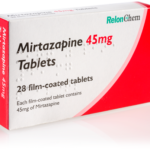New Study Suggests Postnatal Antidepressant Use Benefits Child’s Development

In a promising revelation for new mothers grappling with postpartum depression, a recent study indicates that the use of selective serotonin reuptake inhibitors (SSRIs), a class of antidepressants, may not only alleviate the mother’s condition but also lead to improvements in a child’s behavior for up to five years following birth.
Researchers from the Institute of Psychiatry, Psychology & Neuroscience at King’s College London, in collaboration with the University of Oslo in Norway, conducted an extensive analysis of data collected from over 61,000 mothers and their children who were enrolled during pregnancy as part of the Norwegian Mother, Father, and Child Cohort Study.
The study’s findings unveiled substantial benefits, including reductions in behavioral difficulties observed in children, such as conduct problems and symptoms of attention-deficit/hyperactivity disorder (ADHD). Furthermore, maternal depression also saw a decrease, which, in turn, translated to improved satisfaction in partner relationships.
Dr. Kate Liu, a research associate at the institute and the study’s lead author, emphasized the importance of addressing postnatal depression and its treatment. She explained, “Postnatal depression is a common psychiatric disorder that affects 10 to 15% of women in the first year after childbirth. In the U.K., however, only 3% of women with postnatal depression receive SSRI treatment. This is likely due to a lack of awareness of postnatal depression, alongside concerns about the long-term impact that taking antidepressant medications in the postnatal period may have on child outcomes.”
Liu added that their research showed no indication of increased risks associated with child development due to postnatal SSRI treatment. On the contrary, it demonstrated that SSRI treatment was linked to a reduction in maternal depression and child behavioral issues frequently connected with postnatal depression.
The study tracked mothers who were enrolled during the 17th to 18th week of their pregnancy. Out of the participants, over 8,600 met the diagnostic criteria for postnatal depression at six months postpartum, and around 170 of these received postnatal SSRI treatment.
The researchers assessed maternal depression and child emotional and behavioral difficulties at ages 1.5, 3, and 5 years. Additionally, they collected data on maternal-reported satisfaction in partner relationships at 6 months, 1.5 years, and 3 years postpartum.
Severe postnatal depression was associated with various negative outcomes, including increased future maternal depression, strained partner relationship satisfaction, elevated child emotional and behavioral difficulties, and poorer motor and language development, as well as higher levels of ADHD symptoms.
The introduction of SSRI treatment altered the correlations between postnatal depression and maternal depression at 1.5 and 5 years postpartum, child behavioral difficulties at ages 1.5 and 5 years, ADHD symptoms at age 5, and relationship satisfaction across all time points.
The study, published online on August 29 in JAMA Network Open, received funding support from Wellcome and The Research Council of Norway.
Dr. Tom McAdams, a Wellcome Trust Senior Research Fellow at King’s College London and the senior author of the study, highlighted the critical significance of addressing postnatal depression and its appropriate treatment. He stressed, “Our study found no evidence that SSRI treatment for mothers affected by postnatal depression was linked with an increased risk for childhood emotional difficulties, behavioral problems or motor and language delay.”
These findings provide valuable insights into the potential benefits of postnatal antidepressant use, shedding light on ways to alleviate the impact of postpartum depression on both mothers and their children. You may find useful information on: FDA Approves Sage Therapeutics Zurzuvae For Postpartum Depression (PPD)





